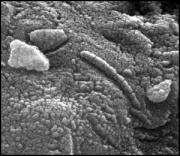PANSPERMIA
 Although the
plotline of The
Fašade does not revolve around panspermia, the idea is explained in
the novel. Briefly, panspermia is the idea that life on earth was
"seeded" from space, either by random processes (undirected
panspermia) or by aliens (intelligent or directed panspermia).
Although the
plotline of The
Fašade does not revolve around panspermia, the idea is explained in
the novel. Briefly, panspermia is the idea that life on earth was
"seeded" from space, either by random processes (undirected
panspermia) or by aliens (intelligent or directed panspermia).
The notion of intelligent panspermia was initially proposed by the late Nobel laureate Dr. Francis Crick, co-discoverer of DNA, and Dr. Leslie Orgel (now with the Salk Institute) in their book, Life Itself (1981). The idea was not popular, due to the greater plausibility (in the minds of scientists) of plain old naturalistic evolution. In the wake of growing disenchantment with traditional Darwinism, brought on in part by the intelligent design movement, both versions of panspermia are getting another look. Non-directed panspermia has credentialed advocates, but most scientists assert that it is fraught with problems (1, 2).
 According
to molecular biologist (and non-Christian) Michael Denton, author of Evolution:
A Theory in Crisis notes, "Nothing illustrates more clearly just how intractable a problem the origin of life has become than the fact that world authorities can seriously toy with the idea of panspermia." For
my own views on how Genesis 1:1-3 can be legitimately understood in
various ways due to its grammar and syntax, click here.
According
to molecular biologist (and non-Christian) Michael Denton, author of Evolution:
A Theory in Crisis notes, "Nothing illustrates more clearly just how intractable a problem the origin of life has become than the fact that world authorities can seriously toy with the idea of panspermia." For
my own views on how Genesis 1:1-3 can be legitimately understood in
various ways due to its grammar and syntax, click here.
In view of the serious problems for undirected panspermia, directed panspermia is starting to gain a hearing with mainstream scientists. For example, one University of Massachusetts cosmologist takes it seriously (1, 2). For years I have been saying that all the arguments Christians now make for intelligent design will be usurped by this paradigm ("intelligent designers"). As long ago as 2001 the New York Times linked intelligent panspermia to the idea of intelligent design.
Intelligent panspermia is nothing new to many readers of The Fašade. It is well known that cults like the Raelians and Scientology promote intelligent panspermia. Mormonism promotes a form of it as well. However, it is primarily through the writings of people like Zecharia Sitchin, Erich von Daniken, and Lloyd Pye that the "alternative science" and "paranormal" audience has come to embrace intelligent panspermia. I'm glad to see some Christian apologists have finally discovered the idea. I oppose intelligent panspermia, but I do not believe that issue has a necessary overlap with the broader question of whether conservative Judeo-Christianity could accommodate an intelligent extraterrestrial reality. I thinks the answer is yes, it could, given careful articulation. Click here for a DVD presentation of my views. Some Christian authors, like Gary Bates, argue for such a link (see my review of Bates' book).